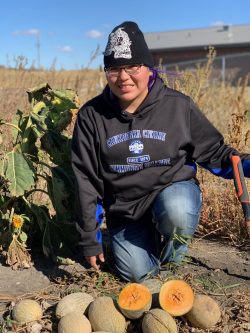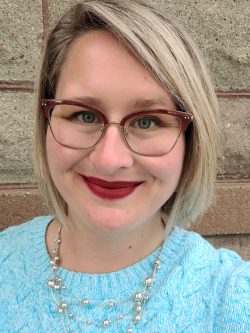
Reflections from the Summit – Virtual opportunities provide access to far away communities
Scholarships offer new access, opportunities to university students at 2020 Summit
By Heidi Ziegenmeyer, Land Grant Director, Cankdeska Cikana Community College
Coming from a small tribal community in North Dakota, attending a “real conference” is often out of reach for my students at Cankdeska Cikana Community College, especially one in Rhode Island.
However, when I learned the 2020 National Coastal and Estuarine Summit was going virtual, I was really interested in giving all of my students in my Natural Resource Management course the opportunity to attend.

Virtual summits allow for greater attendance – this is not something that my students or I would have attended if it had been in-person. A small tribal community in North Dakota gained an open window into research, topics, and people half a continent away.
Of course, there are drawbacks too. It’s a bit harder or awkward to try to network—though networking is always awkward—and you don’t get the same “feel”, the same “buzz” that you feel at regular conferences.
However, access is a big deal. Providing these free or reduced cost opportunities go a long way and if the virtual opportunities remained open (even for just a day of the conference) those who cannot attend due to financial constraints or family commitments can still gain some access from the comfort of their homes.
A big conference in a faraway state, getting on an airplane, meeting SO MANY new people is very daunting for someone who has lived in the same small community their entire life. Virtual opportunities like this one can remove some of that fear and anxiety and provide access.
I remember my first research conference experience and it was exciting and a little overwhelming. It was also inspiring and pushed me to want to do more in my field. I wanted that for my students.
Based on student’s attendance and their response papers for their midterm, I think they became more interested in the big world of science and hopefully can picture themselves pursuing careers there in the future.
There is a lot of good work going on in the field of coastal and estuarine science and habitat management! I know my students gained a greater understanding of coastal issues, especially since we are a land-locked state, and this has broadened their horizons.
 Heidi Ziegenmeyer is the Land Grant Director at Cankdeska Cikana Community College in Fort Totten, ND. Her classroom applied for and received a scholarship to attend the 2020 National Coastal & Estuarine Virtual Summit thanks to generous contributions from the Honda Marine Science Foundation.
Heidi Ziegenmeyer is the Land Grant Director at Cankdeska Cikana Community College in Fort Totten, ND. Her classroom applied for and received a scholarship to attend the 2020 National Coastal & Estuarine Virtual Summit thanks to generous contributions from the Honda Marine Science Foundation.
